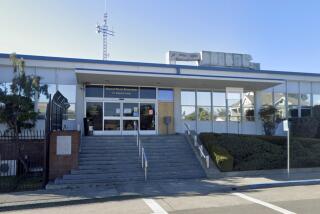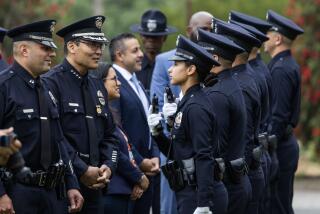San Diego Police Reforms Urged
SAN DIEGO â A task force issued 100 recommendations Wednesday aimed at reducing the use of force by San Diego police, including clearer policies on when force is justified, better training and smoother relations with residents.
The report was 15 months in the making. The 137-member task force, made up of residents and members of the San Diego Police Department, was named last year amid concerns about high-profile fatal shootings by San Diego officers and similar cases in other cities.
The report recommended no drastic reforms but suggested ways to reduce the possibility for violence, including more teams with police dogs and the establishment of a permanent training facility for teaching defensive tactics.
San Diego Police Chief David Bejarano estimated that adopting all the proposals could cost up to $20 million and might require city borrowing.
Bejarano welcomed the recommendations, saying that a third of them could be put in place within 30 to 60 days. He said some were already underway or had been completed.
âWe want to get this done as soon as we can,â Bejarano said. âThis is critical. Weâre talking about officer safety and the lives of our citizens.â
Bejarano said some suggestions, such as drug testing for officers involved in a shooting, probably would have to be negotiated with the police officers union.
Bejarano named the task force after public concern over police conduct in several cases. In February of last year, police fatally shot a mentally disturbed homeless man who waved a tree branch at officers. That came seven months after police shot and killed former pro football player Demetrius DuBose during a confrontation with police in which he took away their martial arts weapons.
The task force recommended that officers get better training in dealing with homeless and mentally ill people.
There were 12 shootings involving San Diego officers last year, six fatal. There have been six this year, all fatal.
The panel suggested adding a reference to the value of human life in the departmentâs force policy and encouraging officers to do all they can to defuse situations without violence, said Guillermo Cabrera, an attorney who co-headed the task force.
The panel also called for training to prevent racial bias by police in making stops, a practice Bejarano has condemned. Department data have shown blacks and Latinos are more likely to be stopped and searched than whites or Asian Americans, but Bejarano has said that does not mean officers are acting improperly.
Linda Hills, executive director of the ACLUâs San Diego branch, lauded the recommendations but said the test would be in fulfilling them. âWeâre hoping this will not be another report gathering dust on the shelf,â she said.
Cecil H. Steppe, president of the San Diego Urban League, echoed that. âTalk is the cheapest commodity in our environment. The behavior speaks for itself.â
The report capped more than 150 meetings by nine task-force committees--sessions marked at times by heated exchanges. Some residents complained at first that police representatives dominated sessions and didnât listen to the others.
James Sloan, a retiree, said his dissatisfaction prompted him to quit, though he rejoined after expressing his frustrations to police commanders.
Other civilians said the process, which also included riding in cruisers and police helicopters, gave them a new view of police work.
âIt exposed me to the team effort,â said Delsa D. Dixon, a community activist. âIt takes a lot of work to contain a situation from becoming explosive.â
More to Read
Sign up for Essential California
The most important California stories and recommendations in your inbox every morning.
You may occasionally receive promotional content from the Los Angeles Times.










